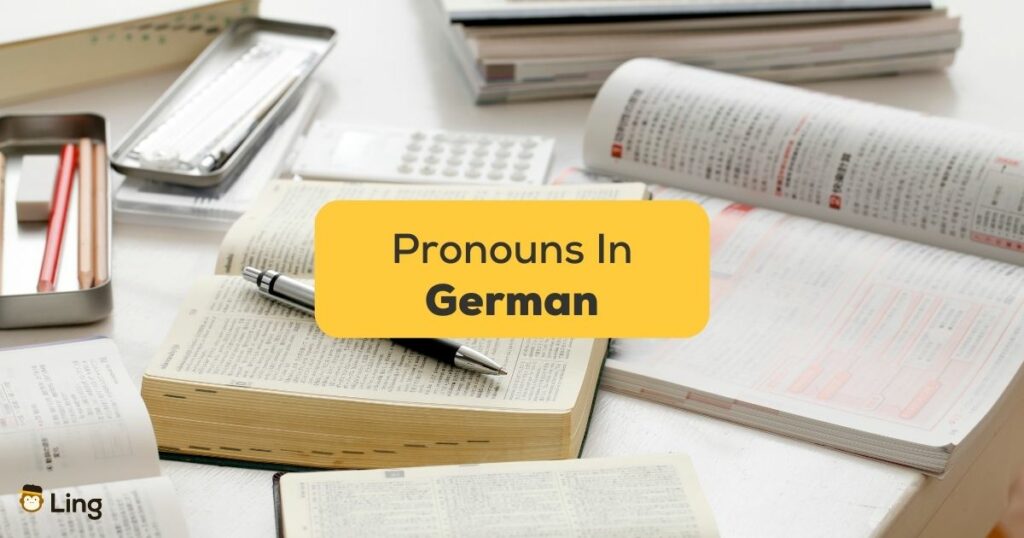Pronouns or Pronomen are essential elements of any language. They serve as substitutes for nouns, indicating persons, things, and places without repeating the same words. In German, pronouns come in a variety of forms, each with its unique declension pattern, gender, and case. Whether you are a beginner or an advanced learner, this comprehensive guide on German pronouns will help you understand the various types of pronouns and how to use them correctly. Let’s begin!
Whenever one thinks of learning a new language, what often comes to mind are the vocabulary drills and memorization of basic expressions. While it’s true that those words and phrases can take you far, learning the grammatical intricacies of your target language can seriously transform how you connect with native speakers. Just imagine using question words and nailing all those different adjective endings without going through Google. Wouldn’t that be a big win for you?
If you’re learning German, you might be wondering how to take your language skills to the next level. While there are many aspects to master, starting with the basics can set you on the right path. That’s why focusing on German pronouns is a great place to start. But wait, you might be thinking, “Isn’t that too elementary? Shouldn’t I be tackling more complex grammar structures right away?” Not necessarily! In fact, mastering pronouns is the foundation upon which you can build more complex sentences.
Think about it: how many times do you use personal pronouns like “I,” “you,” “he,” or “she” in your daily conversations? A lot, right? But with the mastery of all the German pronouns, you can start expressing yourself with more nuance and sophistication. Additionally, this will make it easier for you to pick up on other grammar structures as you continue to learn.
Ready to start speaking fluently? Let’s now go over the German pronouns!

Grammatical Case In German Pronouns
In German, using pronouns can be tricky since you need to consider the grammatical gender (masculine, feminine, and neutral) and the case (nominative, accusative, dative, or genitive). For the gender, you simply have to take note of the suffixes used and the type of word. For instance, nouns related to seasons are usually masculine, while thoughts and concepts are usually neutral.
On the other hand, the case in the German language depends on the role the noun plays in the sentence. Below are some examples to help you distinguish the case better.
- Nominativ (Nominative) = subject (He is a teacher = Er ist ein Lehrer.)
- Akkusativ (Accusative) = direct object (I see him = Ich sehe ihn.)
- Dativ (Dative) = indirect object (I give him the book = Ich gebe ihm das Buch.)
- Genitiv (Genitive) = possession (That is their parents’ car = Das ist das Auto ihrer Eltern.)

German Pronouns
In German, pronouns are called Pronomen, and they substitute for nouns indicating persons, things, and places without repeating the same words. They can also be used to ask questions, demonstrate, or refer to an unspecified entity. In German, pronouns come in a variety of forms, each with its unique declension pattern, gender, and case.
Here are the types of German pronouns:
- Personal pronouns = Personalpronomen
- Demonstrative pronouns = Demonstrativpronomen
- Relative pronouns = Relativpronomen
- Reflexive pronouns = Reflexivpronomen
- Interrogative pronouns = Interrogativpronomen
- Indefinite pronouns = Indefinitpronomen
- Possessive pronouns = Possessivpronomen
Ready to learn more about each? Let’s get to know each of those in the sections below and see how we can use them in sentences.
German Personal Pronouns
Personal pronouns are those that you use when talking about yourself and other people. Think of it as the category for English words like “I,” “you,” “he,” “she,” “it,” “we,” and “they.”
| Person | English | Nominative | Accusative | Dative | Genitive |
|---|---|---|---|---|---|
| 1st | I | ich | mich | mir | meiner |
| 2nd | you | du | dich | dir | deiner |
| 3rd (m) | he | er | ihn | ihm | seiner |
| 3rd (f) | she | sie | sie | ihr | ihrer |
| 3rd (n) | it | es | es | ihm | seiner |
| 1st Pl. | we | wir | uns | uns | unser |
| 2nd Pl. | you | ihr | euch | euch | euer |
| 3rd Pl. | they | sie | sie | ihnen | ihrer |
| Formal | you | Sie | Sie | Ihnen | Ihrer |
German Demonstrative Pronouns
Demonstrative pronouns in German are used to point out or refer to specific nouns. They can be translated to “this,” “that,” “these,” and “those” in English. There are two types of demonstrative pronouns in German: the “near” demonstratives and the “far” demonstratives.
The “near” demonstratives indicate objects that are close to the speaker. Check out how “dieser” is used for this type of demonstrative in the table below.
| Gender | Nominative | Accusative | Dative | Genitive |
|---|---|---|---|---|
| Masculine | dieser | diesen | diesem | dieses |
| Feminine | diese | diese | dieser | dieser |
| Neuter | dieses | dieses | diesem | dieses |
| Plural | diese | diese | diesen | dieser |
When talking about things that are farther away, you can use the word German word “jener.” Check out the table to see the basic forms for it, depending on the gender and case.
| Gender | Nominative | Accusative | Dative | Genitive |
|---|---|---|---|---|
| Masculine | jener | jenen | jenem | jenes |
| Feminine | jene | jene | jener | jener |
| Neuter | jenes | jenes | jenem | jenes |
| Plural | jene | jene | jenen | jener |
German Relative Pronouns
In German, there are several relative pronouns that can be used, depending on the case, gender, and number of the noun they are referring to. The most commonly used relative pronouns in German are “der,” “die,” “das,” “den,” “dem,” “dessen,” and “deren.” They are declined like definite articles and used to refer to people, things, and animals.
| Gender | Nominative | Accusative | Dative | Genitive |
|---|---|---|---|---|
| Masculine | der | den | dem | dessen |
| Feminine | die | die | der | deren |
| Neuter | das | das | dem | dessen |
In addition to these, “welche” and “welcher” are also relative pronouns. “Welche” is used for feminine and plural nouns, while “welcher” is used for masculine and neuter nouns.
| Gender | Nominative | Accusative | Dative | Genitive |
|---|---|---|---|---|
| Masculine | welcher | welchen | welchem | dessen |
| Feminine | welche | welche | welcher | deren |
| Neuter | welches | welches | welchem | dessen |
German Reflexive Pronouns
Reflexive pronouns in German are used to refer to the subject of the sentence, and they are often used with reflexive verbs. Reflexive verbs are verbs where the subject and the object are the same, such as “sich waschen” (to wash oneself) or “sich freuen” (to be happy).
| Person | Singular | Plural |
|---|---|---|
| First Person | mich | uns |
| Second Person | dich | euch |
| Third Person | sich | sich |
| First Person Pl. | uns | uns |
| Second Person Pl. | euch | euch |
| Third Person Pl. | sich | sich |
German Interrogative Pronouns
Interrogative pronouns in German are used to ask questions and to inquire about people, things, and animals. They are often used in the same way as English question words, such as “what,” “who,” “where,” “when,” and “how.” In German, there are several interrogative pronouns, each of which has a specific use. Here are some of the most commonly used interrogative pronouns in German:
| English | German |
|---|---|
| Who | Wer |
| What | Was |
| Where | Wo |
| Where to | Wohin |
| Where from | Woher |
| When | Wann |
| How | Wie |
| Why | Warum |
German Possessive Pronouns
Possessive pronouns in German are a crucial part of the language, used to indicate possession or ownership of a noun. They are similar to English possessive pronouns like “mine,” “yours,” and “theirs.” As shown in the table below, possessive pronouns change according to the case of the noun they modify. In the nominative case, for example, the pronoun “mein” becomes “meine” in the feminine form and “meinen” in the accusative form.
| Person | Nominative | Accusative | Dative | Genitive |
|---|---|---|---|---|
| First Person | mein(e) | meinen/-e | meinem/-r | meiner/-s |
| Second Person | dein(e) | deinen/-e | deinem/-r | deiner/-s |
| Third Person | sein(e) / ihr(e) / sein(e) | seinen/-e / ihre/-e / seinen/-e | seinem/-r / ihrer / seinem/-r | seiner / ihrer / seiner |
| First Person Pl. | unser(e) | unseren/-e | unserem/-r | unserer/-s |
| Second Person Pl. | euer(e) | euren/-e | eurem/-r | eurer/-s |
| Third Person Pl. | ihr(e) | ihre/-e | ihrem/-r | ihrer/-s |
Want To Learn German? Try Ling!
Ready to take your language-learning journey to new heights? Ling is the key to mastering German and over 60 other languages! With it, you can finally say goodbye to boring textbooks and outdated teaching methods! The secret? Ling offers a fun and engaging way to learn a new language with interactive lessons, games, and chatbot conversations!
Since it can be downloaded to your phone, you can learn German at your own pace, on your own schedule, and from anywhere in the world! No wonder why Ling is the leading resource for beginners today! But don’t just take our word for it – join the thousands of happy users who have already achieved language mastery with Ling.
So what are you waiting for? Download it today for the Google Play Store or App Store to start your language-learning journey!



































































